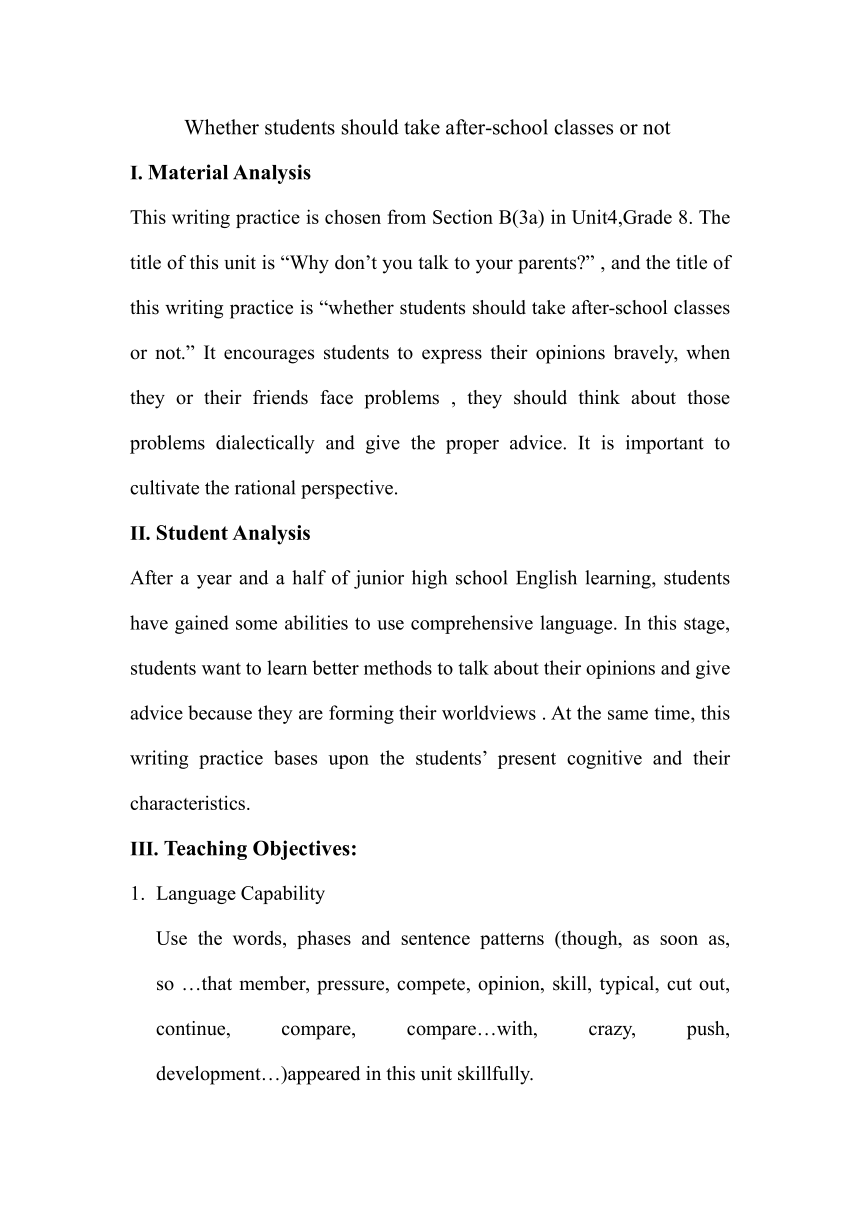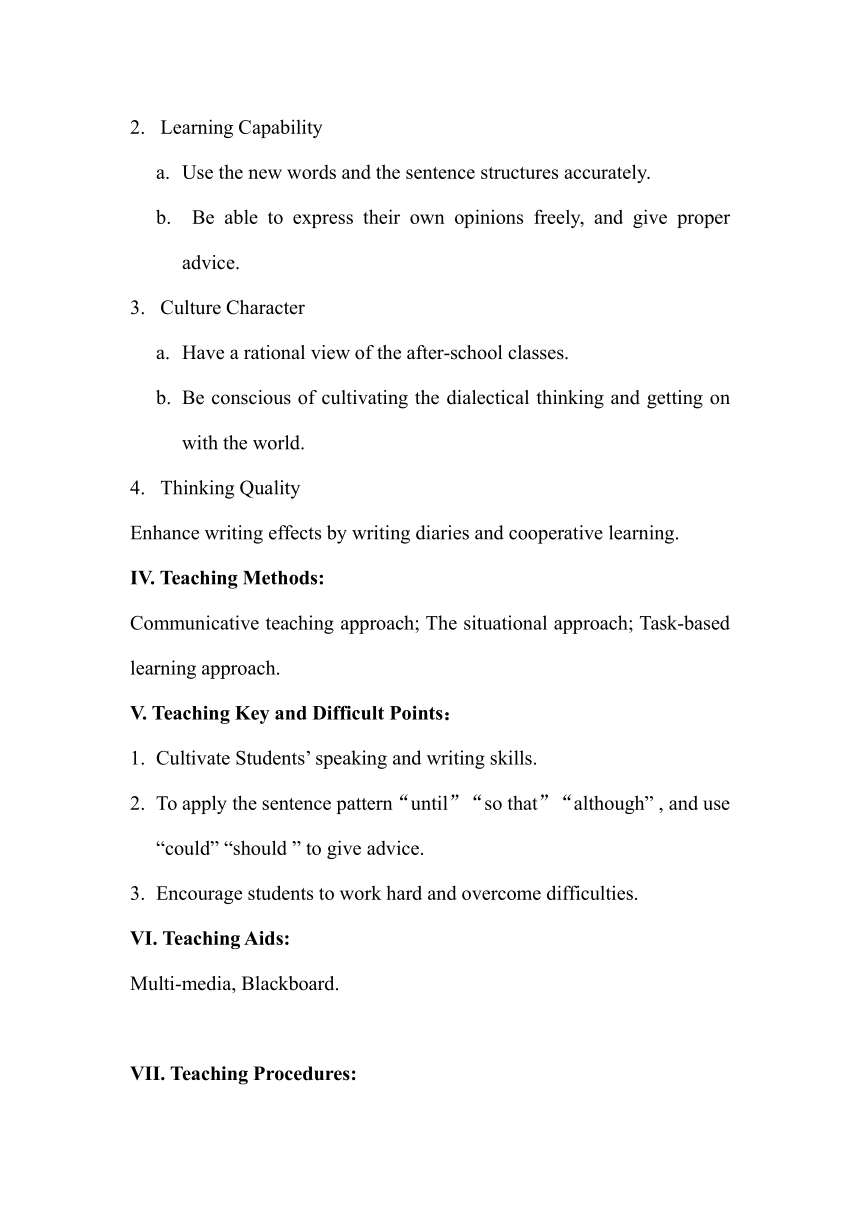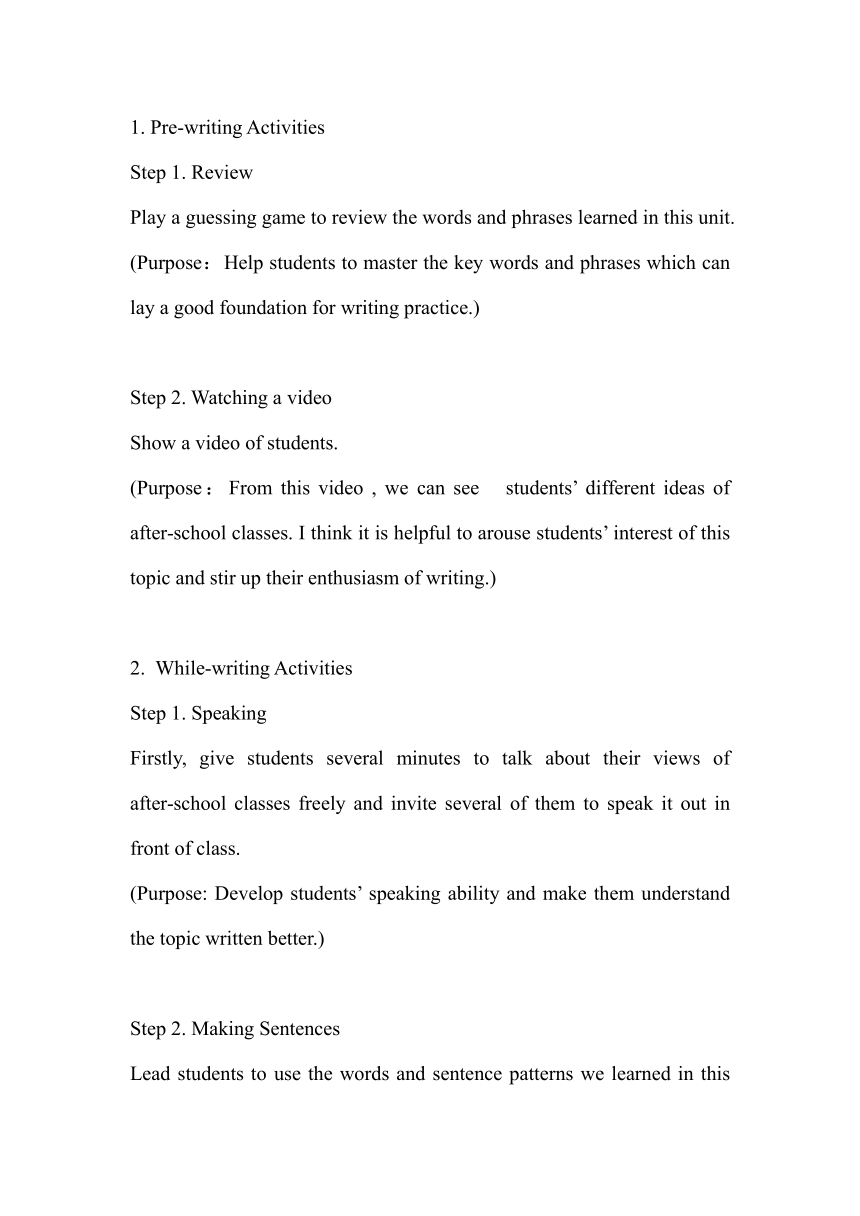Unit4 Why don't you talk to your parents?Writing(教案)
文档属性
| 名称 | Unit4 Why don't you talk to your parents?Writing(教案) |  | |
| 格式 | docx | ||
| 文件大小 | 29.7KB | ||
| 资源类型 | 教案 | ||
| 版本资源 | 人教新目标(Go for it)版 | ||
| 科目 | 英语 | ||
| 更新时间 | 2022-03-26 11:38:39 | ||
图片预览



文档简介
Whether students should take after-school classes or not
I. Material Analysis
This writing practice is chosen from Section B(3a) in Unit4,Grade 8. The title of this unit is “Why don’t you talk to your parents ” , and the title of this writing practice is “whether students should take after-school classes or not.” It encourages students to express their opinions bravely, when they or their friends face problems , they should think about those problems dialectically and give the proper advice. It is important to cultivate the rational perspective.
II. Student Analysis
After a year and a half of junior high school English learning, students have gained some abilities to use comprehensive language. In this stage, students want to learn better methods to talk about their opinions and give advice because they are forming their worldviews . At the same time, this writing practice bases upon the students’ present cognitive and their characteristics.
III. Teaching Objectives:
Language Capability
Use the words, phases and sentence patterns (though, as soon as, so …that member, pressure, compete, opinion, skill, typical, cut out, continue, compare, compare…with, crazy, push, development…)appeared in this unit skillfully.
Learning Capability
Use the new words and the sentence structures accurately.
Be able to express their own opinions freely, and give proper advice.
Culture Character
Have a rational view of the after-school classes.
Be conscious of cultivating the dialectical thinking and getting on with the world.
Thinking Quality
Enhance writing effects by writing diaries and cooperative learning.
IV. Teaching Methods:
Communicative teaching approach; The situational approach; Task-based learning approach.
V. Teaching Key and Difficult Points:
Cultivate Students’ speaking and writing skills.
To apply the sentence pattern“until”“so that”“although” , and use “could” “should ” to give advice.
Encourage students to work hard and overcome difficulties.
VI. Teaching Aids:
Multi-media, Blackboard.
VII. Teaching Procedures:
1. Pre-writing Activities
Step 1. Review
Play a guessing game to review the words and phrases learned in this unit. (Purpose:Help students to master the key words and phrases which can lay a good foundation for writing practice.)
Step 2. Watching a video
Show a video of students.
(Purpose:From this video , we can see students’ different ideas of after-school classes. I think it is helpful to arouse students’ interest of this topic and stir up their enthusiasm of writing.)
While-writing Activities
Step 1. Speaking
Firstly, give students several minutes to talk about their views of after-school classes freely and invite several of them to speak it out in front of class.
(Purpose: Develop students’ speaking ability and make them understand the topic written better.)
Step 2. Making Sentences
Lead students to use the words and sentence patterns we learned in this unit to translate what they have said just now in English. In this part, I will invite students to come to blackboard to write them down. Next, invite other students to act as teachers to point out if there any mistakes.
(Purpose: Basic sentences are the bases of a writing practice. )
Step 3. Dubbing and Acting
Divide students into eight groups and invite them to dub for the video I showed before class. Give them five minutes to do it, then lead them to act it out. After that, give them estimates and correct the mistakes in time.
(Purpose: This is a funny activity, which not only inspires students’ interest in English, but also improves students’ reading and writing skills.)
Step 4. Show a model
Should I take after school classes Is it good for me Different people have different ideas about it.
Some of my classmates think taking after school classes is a waste of time and money, they take away the free time. kids have no time to relax and just do nothing if they take too many after- school classes.
however, others believe taking after school classes is good for our future. It can help kids get into good high schools and good universities. some of these classes help kids get better grades at school. Some classes also help kids to learn important skills not taught at school. In my opinion, we can cut out some of our after school classes. We can learn what we are interested in so that we can do what we want to do in our free time.
Step 5 Have a try
Try to write a passage about whether students should take after-school classes or not. Give students 10 minutes to do it. Then choose several students’ work to show before class. At the same time, let other students to point out the mistakes.
( Purpose: Through this practice, students will realize the importance of use language correctly, especially, they will pay attention to the accurate use of grammar. At the same time, students’ logical thinking and language organizational capacity can also be enhanced. )
Post-writing Activities
Step1. Summary
First, invite students to summary the writing skills we learned in this class. Next, lead students to conclude the strategies again.
(Purpose: Cultivate students’ independent thinking and practical ability.)
Step 2 Group-work
Ask students to revise their composition written by cooperating.
Invite students to show their works.
((Purpose: To encourage students to cooperate with each other and arouse their interest in writing.)
VIII. Homework
Enjoy the model essay.
Write a new composition about the topic whether students should take
after-school classes or not.
(Purpose: Encourage students to do more exploration about writing and improve their integrative competence by doing this .)
IX. Blackboard design
Writing
It is like building a beautiful house when we write a composition. The solid foundation is the key part of this grand building.
(
Writing
The cornerstones of the writing world
)
(
Great Analysis
)
(
Great Organization
)
(
Great
Language
)
(
S
ystematic Practice
)
(
XI
Teaching reflection
Writing is the teaching key and difficult part of my daily teaching. I should be patient enough to lead students to do the relevant exercises. Through the writing practice, students can make a deeper thinking about the social problems mentioned in this class and learn to express their own opinions. At the same time, writing a composition helps students to improve their ability of language organization and logical thinking a lot. However, it’s a little bit difficult for most students to complete this task. Thus, how to arouse students’ interest and lead them to write a good composition is still my primary teaching task.
)
I. Material Analysis
This writing practice is chosen from Section B(3a) in Unit4,Grade 8. The title of this unit is “Why don’t you talk to your parents ” , and the title of this writing practice is “whether students should take after-school classes or not.” It encourages students to express their opinions bravely, when they or their friends face problems , they should think about those problems dialectically and give the proper advice. It is important to cultivate the rational perspective.
II. Student Analysis
After a year and a half of junior high school English learning, students have gained some abilities to use comprehensive language. In this stage, students want to learn better methods to talk about their opinions and give advice because they are forming their worldviews . At the same time, this writing practice bases upon the students’ present cognitive and their characteristics.
III. Teaching Objectives:
Language Capability
Use the words, phases and sentence patterns (though, as soon as, so …that member, pressure, compete, opinion, skill, typical, cut out, continue, compare, compare…with, crazy, push, development…)appeared in this unit skillfully.
Learning Capability
Use the new words and the sentence structures accurately.
Be able to express their own opinions freely, and give proper advice.
Culture Character
Have a rational view of the after-school classes.
Be conscious of cultivating the dialectical thinking and getting on with the world.
Thinking Quality
Enhance writing effects by writing diaries and cooperative learning.
IV. Teaching Methods:
Communicative teaching approach; The situational approach; Task-based learning approach.
V. Teaching Key and Difficult Points:
Cultivate Students’ speaking and writing skills.
To apply the sentence pattern“until”“so that”“although” , and use “could” “should ” to give advice.
Encourage students to work hard and overcome difficulties.
VI. Teaching Aids:
Multi-media, Blackboard.
VII. Teaching Procedures:
1. Pre-writing Activities
Step 1. Review
Play a guessing game to review the words and phrases learned in this unit. (Purpose:Help students to master the key words and phrases which can lay a good foundation for writing practice.)
Step 2. Watching a video
Show a video of students.
(Purpose:From this video , we can see students’ different ideas of after-school classes. I think it is helpful to arouse students’ interest of this topic and stir up their enthusiasm of writing.)
While-writing Activities
Step 1. Speaking
Firstly, give students several minutes to talk about their views of after-school classes freely and invite several of them to speak it out in front of class.
(Purpose: Develop students’ speaking ability and make them understand the topic written better.)
Step 2. Making Sentences
Lead students to use the words and sentence patterns we learned in this unit to translate what they have said just now in English. In this part, I will invite students to come to blackboard to write them down. Next, invite other students to act as teachers to point out if there any mistakes.
(Purpose: Basic sentences are the bases of a writing practice. )
Step 3. Dubbing and Acting
Divide students into eight groups and invite them to dub for the video I showed before class. Give them five minutes to do it, then lead them to act it out. After that, give them estimates and correct the mistakes in time.
(Purpose: This is a funny activity, which not only inspires students’ interest in English, but also improves students’ reading and writing skills.)
Step 4. Show a model
Should I take after school classes Is it good for me Different people have different ideas about it.
Some of my classmates think taking after school classes is a waste of time and money, they take away the free time. kids have no time to relax and just do nothing if they take too many after- school classes.
however, others believe taking after school classes is good for our future. It can help kids get into good high schools and good universities. some of these classes help kids get better grades at school. Some classes also help kids to learn important skills not taught at school. In my opinion, we can cut out some of our after school classes. We can learn what we are interested in so that we can do what we want to do in our free time.
Step 5 Have a try
Try to write a passage about whether students should take after-school classes or not. Give students 10 minutes to do it. Then choose several students’ work to show before class. At the same time, let other students to point out the mistakes.
( Purpose: Through this practice, students will realize the importance of use language correctly, especially, they will pay attention to the accurate use of grammar. At the same time, students’ logical thinking and language organizational capacity can also be enhanced. )
Post-writing Activities
Step1. Summary
First, invite students to summary the writing skills we learned in this class. Next, lead students to conclude the strategies again.
(Purpose: Cultivate students’ independent thinking and practical ability.)
Step 2 Group-work
Ask students to revise their composition written by cooperating.
Invite students to show their works.
((Purpose: To encourage students to cooperate with each other and arouse their interest in writing.)
VIII. Homework
Enjoy the model essay.
Write a new composition about the topic whether students should take
after-school classes or not.
(Purpose: Encourage students to do more exploration about writing and improve their integrative competence by doing this .)
IX. Blackboard design
Writing
It is like building a beautiful house when we write a composition. The solid foundation is the key part of this grand building.
(
Writing
The cornerstones of the writing world
)
(
Great Analysis
)
(
Great Organization
)
(
Great
Language
)
(
S
ystematic Practice
)
(
XI
Teaching reflection
Writing is the teaching key and difficult part of my daily teaching. I should be patient enough to lead students to do the relevant exercises. Through the writing practice, students can make a deeper thinking about the social problems mentioned in this class and learn to express their own opinions. At the same time, writing a composition helps students to improve their ability of language organization and logical thinking a lot. However, it’s a little bit difficult for most students to complete this task. Thus, how to arouse students’ interest and lead them to write a good composition is still my primary teaching task.
)
同课章节目录
- Unit 1 What's the matter?
- Section A
- Section B
- Unit 2 I'll help to clean up the city parks.
- Section A
- Section B
- Unit 3 Could you please clean your room?
- Section A
- Section B
- Unit 4 Why don't you talk to your parents?
- Section A
- Section B
- Unit 5 What were you doing when the rainstorm came
- Section A
- Section B
- Review of Units 1-5
- Unit 6 An old man tried to move the mountains.
- Section A
- Section B
- Unit 7 What's the highest mountain in the world?
- Section A
- Section B
- Unit 8 Have you read Treasure Island yet?
- Section A
- Section B
- Unit 9 Have you ever been to a museum?
- Section A
- Section B
- Unit 10 I've had this bike for three years.
- Section A
- Section B
